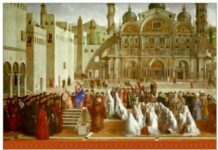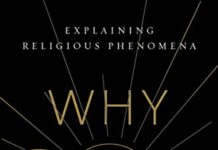
Ebook Info
- Published: 2017
- Number of pages: 202 pages
- Format: PDF
- File Size: 2.98 MB
- Authors: Rodney Stark
Description
What has the Reformation ever done for us?A lot less than you might think, as Rodney Stark shows in this enlightening and entertaining antidote to recent books about the rise of Protestantism and its legacy.‘Rodney Stark takes no prisoners as he charges through five hundred years of history, upsetting apple carts left and right. Almost everything you thought you knew about the Reformation turns out to be a false narrative. . . In future, anyone who makes sweeping claims about the benefits of Protestantism ought to check their assumptions against Stark’s research first.’ Clifford Longley, author and journalist ‘Stark brings the insights of a distinguished sociologist of religion to bear on a range of inherited assumptions about the impact of the Reformation . . . The result makes for salutary reading in this year of commemoration and (not always justified) celebration.’ Peter Marshall, Professor of History, University of Warwick‘Stark changed the way we think about the early Church and this book may change the way you think about Protestantism . . . Reformation Myths cuts through pious certainties and challenges us to think again about our cultural history.’ Linda Woodhead MBE DD, Professor of Sociology of Religion, Lancaster University
User’s Reviews
Reviews from Amazon users which were colected at the time this book was published on the website:
⭐Coming after the author’s recent
⭐, Rodney Stark continues in his contrarian direction of rehabilitating the history of the Catholic Church. This time his target is on the certain myths of the Reformation, which are accepted as true in the Protestant English-speaking world and which have a tendency to ascribe unique virtues to Protestantism and corresponding vices to Catholicism. This trend comes as a surprise since Stark was raised Lutheran, is not Catholic, and works at a Protestant school. Although Stark believes that the Reformations did more good than harm – mostly by creating pluralistic competition that improves the religious “product” – he acknowledges that his book will be as welcome as a “skunk at a picnic” in this 500th anniversary of Luther’s Reformation.Stark starts out by distinguishing the Reformation from the “Reformations.” his accurate point is that there were three Reformations – Luther’s, Calvin’s and Henry’s – which were different in some ways but ultimately all had the tendency of enhancing state power, which, paradoxically, had the effect of lessening competition and stultifying religion. Stark makes a point that I noticed years ago, but which is not popular, namely that the Reformations accentuated and heightened state power by subordinating ecclesiastical power to state power. As Stark points out, the difference between nations that remained Catholic and those that became Protestant was that the Catholic nations had reached an accommodation that ceded substantial power to the state in terms of ecclesiastical appointments, in return for financial support, but Catholicism retained an extra-national locus of loyalty and power. In contrast, soon-to-be Protestant rulers realized that becoming Protestant would enable them to strip away power, property, and loyalty from the church. This strategy had immediate positive returns for increasing state power. As explained by Stark:”In contrast, in other parts of Europe the enormous value of Church property, and the Church’s continuing financial extractions, served as powerful temptations and bitter grievances. So long as there had been only One Church, it was risky to challenge papal authority, as Henry IV discovered when he was kept waiting barefoot in the snow by Pope Gregory VII. But now, Lutheranism offered an alternative source of religious legitimacy, making excommunication an empty threat. This was why so many German princes rallied to Luther: they gained huge amounts of immediate wealth by seizing Church property (in some places the Church owned half of the land), and they continued to benefit from the flow of tithes and legacies to the state churches which they controlled.”Stark addresses the following issues in some relatively brief by lively chapters.1. Protestant piety versus Catholic laziness. Stark canvasses the sources and concludes that Protestantism did not result in a regeneration of manners and morals. Christians prior to the Reformation were very often nominal Christians and had a tendency to prefer drinking on a Sunday to going to church. In Protestant areas, the great mass of people subject to the Reformation remained unchurched and resistant to Protestant sermons and moral demands. Before and after the Reformation, Christians tended to define Christianity in practical terms rather than educated formulas.One of the interesting points in this section is how the development of Protestantism resulted in a backing away from limitations on state power. As Stark points out, Christianity had developed a theory of resistance to tyranny in the writings of Augustine and Aquinas. Although Catholicism has been blamed for advancing the “divine right of kings”, Stark notes:”This is nonsense. The Church never endorsed the notion of the divine right of kings. That was first proclaimed by James I of England (1566– 1625), a Protestant after whom the King James Version of the Bible is named. Instead, the Catholic Church always asserted that its authority was greater than that of monarchs. From St Augustine through St Thomas Aquinas, the great Church theologians denied the moral authority of the state and condemned tyrants, warranting their overthrow. Moreover, the Church was entirely at ease with the limited democracies that evolved in the Italian city states long before any Reformations and in 1215 the English bishops participated in forcing King John to sign the Magna Carta. Finally, by taking control of the Church as well as the state, many ‘Protestant’ monarchs were far more powerful than had been the case in these same kingdoms prior to the Reformations. Indeed, Luther fully supported ‘the development of strong centralized states and absolute monarchies’.”2. Enforced Piety.With the additional power from controlling the church, Protestant rulers were able to require outward conformity with Protestant piety, such as going to church. Stark explains:”All three Reformations gave rise to state churches – monopoly institutions ruled by heads of state and sustained by laws that were enforced by civil authorities. In contrast, being unwilling to subordinate itself to control by the state, the Roman Catholic Church was never in a position to attempt to legally force individual acts of piety and, perhaps, too sophisticated to attempt it. But that is precisely what the Reformation-based state churches tried to do. The masses were going to be devout, whether they liked it or not!”States – Protestant and Catholic – tended to keep the competition out of their territories, which made state churches monopolistic and lazy. That condition continues into modern times:”There are Lutheran state churches in Denmark, Finland, Iceland and Norway, and although the Church of Sweden lost its established position in 2006, the government continues to collect a religious tax on its behalf. The clergy of these state churches (including the Swedish Church) are civil servants, belong to trade unions, and have the right to strike. They are nearly impossible to fire. A priest in the Danish Church attracted international attention when he published a book proclaiming his atheism. He was quoted in a national newspaper thus: ‘God belongs in the past. He actually is so old fashioned that I am baffled by modern people believing in his existence. I am thoroughly fed up with empty words about miracles and eternal life.’ 25 After a hearing, he was returned to his parish pulpit.”Stark also holds that Martin Luther’s virulent anti-Semitism had some responsibility for the German acceptance of Nazi anti-Semitism since the Nazis were able to use Luther’s writings for their purposes.Stark concludes:”To sum up: the Reformations resulted in state churches that were even more repressive of individuals than the Catholic Church ever attempted to be. The Reformations did not contribute anything to religious freedom and tolerance; to the contrary. Finally, Martin Luther’s vicious anti-Semitism played a significant role in legitimating the Holocaust, just as William Shirer claimed.”3. Protestantism and Nationalism. Stark notes that the rise of Protestantism meant the shattering of the pan-Christian culture that had existed prior to the Reformation.4. Protestantism and the Protestant Ethic. The myth – still widely believed – started by Max Weber, hence “the Weber Thesis” – is that Calvinism created the mindset of thrifty, hard-working industriousness that formed the cultural base of modern capitalism. The problem with this thesis is that capitalism developed in Catholic countries prior to the revolution, and, in fact, the quintessential institution that developed capitalism were Catholic religious orders.I will admit that I was taught the Weber thesis in high school in the 1970s, and I subscribed to it notionally – and still sort of do – for years. Stark points out that Weber’s book, The Protestant Ethic and the Spirit of Capitalism, is still considered the fourth most important book in sociology in the twentieth century.5. Protestantism and Science. Stark debunks the notion that science started with Protestantism and was essentially a Protestant project. Stark points out the history of pre-Reformation science on which modern science was built and the presence of Catholic scientists in Europe.6. Protestantism and Individualism. Stark debunks the notion that Protestant countries had a higher rate of suicide, which is taken as evidence of the greater development of individualism in those countries. This correlation was deduced by Emile Durkheim and has been repeated throughout the literature. Stark points out that not only is the data faulty, but Durkheim must have known the data was faulty.Stark disputes that Luther was responsible for individualism. I am, frankly, not sure where the argument was for this conclusion.7. Protestantism and Secularism. Another trope is that Protestantism is responsible for secularism by fostering the “disenchantment of nature.” Under this view, modernity has come to view nature and existence in materialistic terms rather than sacramental terms. In response Stark argues that pre-modernity was not a time of rampant piety and the movement toward secularism is overstated.8. Protestantism and Catholicism. In this section, Stark fully amplifies the “Stark Thesis,” namely that while monopolistic state churches are lazy, and cause lower religious participation rates, competition revives churches and leads to increased participation rates. In support of that argument in this chapter, Stark offers the recent history of Catholicism in Latin America.Faced with unprecedented competition from Protestantism, Catholicism tried two responses. The first was a political response in the form of Liberation Theology, which sought to create communal “base communities.” This response failed miserably.The second response was the religious response of Pentecostal Catholicism, which adapted Protestant Pentecostal forms to Catholicism, and has been wildly successful. Stark surprised me by reporting that weekly Mass attendance in countries such as Guatemala, Colombia, and Ecuador are approximately 70%. Likewise, Catholic ordinations and Marian apparitions are stronger than ever in history.Stark chalks all of this up to competition from Protestantism, which makes it the unintended gift of the Reformation.Stark ends his book with an observation that encapsulates my experience over the last twenty-five years:”The myth of the Protestant Ethic and the rise of capitalism was convincingly refuted within a few years of its publication. And then, again and again – and yet again. But it won’t die. It lives on in introductory sociology textbooks and among most sociologists who, not so long ago, ranked Weber’s utterly debunked study as the fourth most important sociological work of the twentieth century. Why? Indeed, why do so many scholars continue to repeat nonsense about Catholic opposition to science and thereby attribute the scientific ‘revolution’ to Protestantism? The answer is as simple as it is distressing: the English-speaking world remains in the grip of the bitter anti-Catholicism that arose during the religious wars produced by the Reformations. And that prejudice acts to certify Protestant virtues.Little has changed since Peter Viereck described ‘Catholic-baiting’ as ‘the thinking man’s anti-Semitism’. 1 Events that would have caused national outrage and been classified as ‘hate crimes’, had they been conducted in a synagogue or a mosque, or even in a Baptist church, have been downplayed and often excused by the media in the United States and Canada, such as when demonstrators interrupted a mass, screaming obscenities and throwing around condoms and used sanitary napkins, as happened in both Montreal and New York City. Granted that few academics in either the United Kingdom or North America would endorse these incidents, but most of them no doubt still agree with the New York drama critics and public intellectuals when they praised The Deputy, a play in which Pope Pius XII is depicted as having been complicit in the Holocaust. Indeed, academics continue to give favourable reviews to books making these same charges, despite the fact that an all-star group of Jews, including two prime ministers of Israel, condemned these claims and praised Pope Pius for his many effective efforts to save Jews during the Second World War.”As a personal aside, I will note that while I can find resources, books and articles on Catholic bad behavior during the Reformation – google “St. Bartholomew’s Day Massacre” – I am hard put to locate resources on Protestant bad behavior – google “Pilgrimage of Grace.” Likewise, I have been pulled into a deep study of Catholicism’s relationship with the Nazis and I have noted that books written at the time uniformly identify the Catholic Church as resisting the Nazis and being victimized by it, modern books simply assume or imply that the Catholic Church enabled or was complicit with the Nazis.Honestly, I’ve felt that there was more going on than a coincidence. Having a non-Catholic scholar like Stark confirm my observations is a satisfying reality check.
⭐I have enjoyed reading a number of books by Rodney Stark because of his ability to summarize large amounts of background information and research into an easy-to-grasp and clear writing style. This book continues his effort–as a Protestant–to debunk myths and misconceptions about the Catholic Church. Stark’s 2016 Bearing False Witness was his first full volume defending the Catholic Church. As a Protestant pastor, I have appreciated Stark’s defense of Catholics because I value truth more than old prejudices.In this book there is a lot of material Stark has presented before. However, in most cases, he has expanded and updated the material. If you have read What Americans Really Believe (2008), then you will have some familiarity with topics in Reformation Myths.I have given this book five stars because I believe it may be one of (if not the most) important book(s) Stark has written. It simultaneously slays tired, old tropes against the Catholic Church as it enlightens the reader about the startling growth of Christianity. Both are worthy subjects.As an Evangelical Protestant I found Stark’s chapter number 8 on, The myth of harmful Protestant effects on the Catholic Church to be very helpful. One of Stark’s primary points is that religious competition between denominations and churches spurs on church growth. Conversely, state subsidized or protected denominations engender indolent clergy and empty churches. The weak and empty churches of Europe serve as exhibit A of Stark’s premise. In chapter 8 he demonstrates how the competition from Evangelical and Pentecostal missionaries in Latin America caused–ironically–a revival of Catholic attendance, evangelism, and dynamic worship in the Southern Hemisphere.I particularly enjoyed chapter 8 because I have been a witness to the Catholic Latin American revival. As Stark notes, Catholic clergy and intellectuals initially responded to competition from Evangelical and Pentecostals by propagating Liberation Theology. When I was in seminary during the mid-80s, Latin American Liberation Theology was the rage. I had to read and study Gustavo Gutierrez’s tome on the subject and constantly rehearse in class that God has a “preferential option for the poor” and ponder how salvation was a political-communal experience (through “base communities”) rather than an individual experience of faith in the risen Lord Jesus.I distinctly remember class discussions where I attempted to persuade others that Liberation Theology was merely a thinly veneered version of Marxism and that it would not appeal to the average person in Latin America. I sensed this because my wife’s grandparents were having excellent success in Mexico as simple Pentecostal missionaries. They were building churches, converting people and transforming lives by avoiding politics and sticking to the power of the Holy Spirit.Of course, Liberation Theology failed miserably, but Catholics from North America who had been involved in the Charismatic ecumenical movement–rubbing shoulders with like-minded Protestants–transplanted the Charismatic Catholic movement to Latin America. As Stark reports in chapter 8, this Charismatic version of Catholicism exploded across the Southern Hemisphere. Now both Evangelical-Protestant and Catholic movements are experiencing unusual success. This is an example where religious competition stimulates the use of “best practices.” Of course, as expected,Liberation Theology continues to appeal to academics.So, as Stark notes, Protestants have not had a harmful effect upon the Catholic Church. The reality is quite the opposite in areas where there is genuine religious competition.Rodney Stark’s insight about religious competition, as described in chapter 8, is so noteworthy that every Christian should read this book.
⭐This is the most thought-provoking and readable book I have read for some time. It challenges many views of history I had assumed were true and provides good evidence about the results of the Reformation. If you are interested in religion or history, this book is well worth reading.
⭐Useful corrective to some of the glib generalisations about the reformation and protestantism, though I don’t entirely buy his analysis that Islam is philosophically antipathetic to scientific endeavour as that it refuted by the flowering of such in the early caliphates, and it neglects the diversity of the reformation including the Anabaptist and Catholic Reformations.
⭐A gift. Arrived in good time.Great value
⭐Very well-researched and intelligently written, this book unveils some interesting insights into the Reformation and its outcome, although it is undoubtedly coloured by the Roman Catholic viewpoint of its author. He treats the Reformation’s leaders with respect but does, in my opinion, downplay the value of the teachings of Luther, Calvin and other leaders contemporary with them. This is certainly a book worth reading and thinking about, by Protestants in particular, although it should be balanced by reading other assessments of the Reformation and its fruits.
⭐Unbalanced and lacking academic research to enable the reader to form an informed view of the developments in the period described. A great opportunity missed owing to poor research and any new material, almost childlike in its presentation.
Keywords
Free Download Reformation Myths: Five Centuries Of Misconceptions And (Some) Misfortunes in PDF format
Reformation Myths: Five Centuries Of Misconceptions And (Some) Misfortunes PDF Free Download
Download Reformation Myths: Five Centuries Of Misconceptions And (Some) Misfortunes 2017 PDF Free
Reformation Myths: Five Centuries Of Misconceptions And (Some) Misfortunes 2017 PDF Free Download
Download Reformation Myths: Five Centuries Of Misconceptions And (Some) Misfortunes PDF
Free Download Ebook Reformation Myths: Five Centuries Of Misconceptions And (Some) Misfortunes




